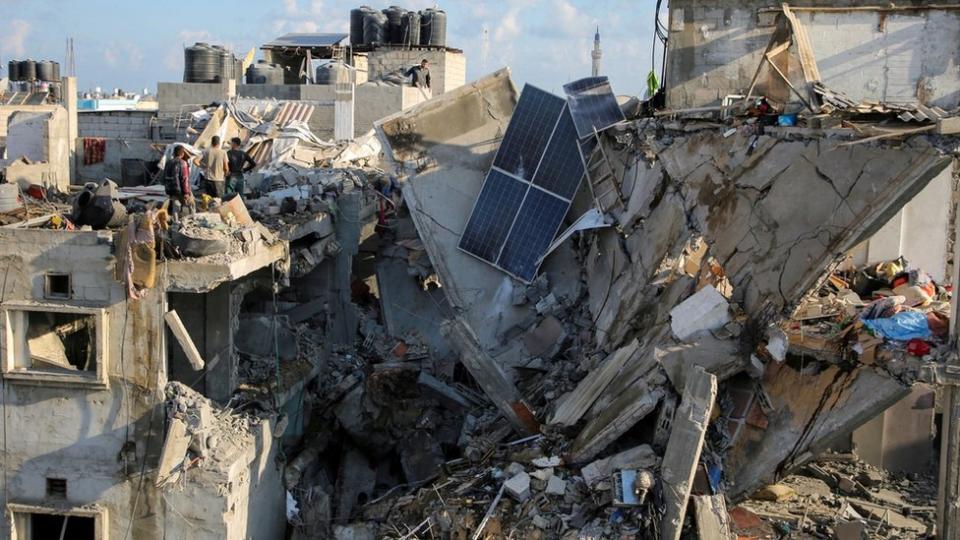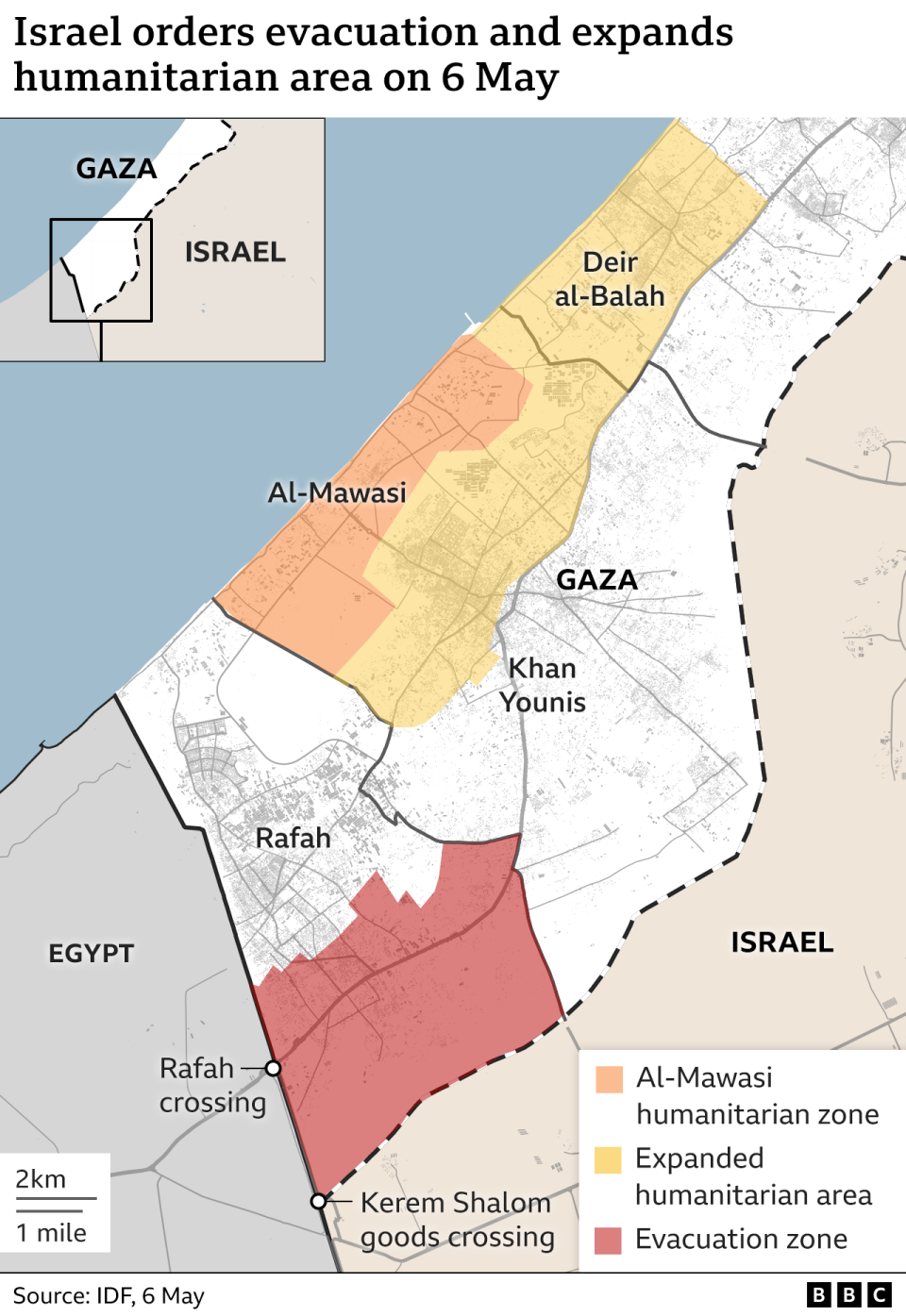The Israeli military claims that its troops have taken “operational control” of the Palestinian side of the Rafah border crossing, between Gaza and Egypt.
Rafah has been a key entry point for aid and the only exit for people who have managed to flee since the start of the war between Israel and Hamas in October.
A tank brigade advanced to the crossing area after a night of intense attacks.
With Israel’s Kerem Shalom crossing also closed, the UN warned that Gaza’s two main humanitarian aid arteries were now blocked.
On Tuesday, the White House said it had been informed that Kerem Shalom would reopen on Wednesday.
On Monday, the Israeli military ordered tens of thousands of civilians to begin evacuating parts of the eastern city of Rafah, ahead of what it called a “limited” operation to eliminate Hamas fighters and dismantle infrastructure.
Hamas said the raid and seizure of Israel’s Rafah crossing was aimed at undermining attempts by regional mediators to secure a new ceasefire agreement.
The Palestinian armed group said on Monday it had accepted a proposal from Egypt and Qatar, which is based on a weeks-long pause in fighting and the release of several dozen hostages still held in Gaza.
Israeli Prime Minister Benjamin Netanyahu said on Tuesday that Hamas’ announcement was “a far cry from Israel’s necessary requirements” and that it was a failed attempt to “disrupt the entry of our forces into Rafah.”
He said he had instructed the mid-level Israeli delegation sent to Cairo on Tuesday to “stand firm” on the conditions required for the return of the hostages and on the “vital requirements for ensuring Israel’s security.”
Israeli Defense Minister Yoav Gallant told troops on the Gaza border: “We will not stop operating in Rafah until Hamas is destroyed or until the first hostage returns home.”
UN Secretary-General António Guterres said an agreement between Israel and Hamas was “essential to end the unbearable suffering of the Palestinians in Gaza and the hostages and their families.”
“I reiterate my call on both parties to demonstrate political courage and spare no effort to secure a deal now,” he added.
Israel launched a military campaign in Gaza to destroy Hamas in response to the group’s cross-border attack on southern Israel on October 7, during which around 1,200 people were killed and more than 250 were taken hostage.
More than 34,780 people have been killed in Gaza since then, according to the territory’s Hamas-run Ministry of Health.
A deal agreed in November allowed Hamas to release 105 hostages in exchange for a week-long ceasefire and around 240 Palestinian prisoners in Israeli prisons. Israel says 128 hostages are missing, 34 of whom are believed dead.

Israel has long insisted that it must eliminate the remaining Hamas battalions in Rafah to achieve victory in the war.
But with more than a million displaced Palestinians sheltering there, the UN and Western powers have warned that a major ground offensive could have devastating humanitarian consequences.
On Monday night, flares lit up the city’s skies and witnesses said there was continuous Israeli shelling.
Palestinian news agency Wafa cited medical sources at the local Kuwait Specialized Hospital, saying 20 people died and dozens were injured.
Raed al-Derby said his wife and children were killed in an attack that destroyed his family’s home in the western neighborhood of Tal al-Sultan.
“We are patient and we will remain firm on this land… We are waiting for liberation and this battle will be for liberation, God willing,” he told the Reuters news agency.
Seven bodies were reportedly recovered from the rubble of the homes of two families in al-Jneineh.
It is one of the eastern neighborhoods whose roughly 100,000 residents were ordered by the Israel Defense Forces (IDF) on Monday to evacuate and move toward an “expanded humanitarian area” stretching north from al-Mawasi to the city of Khan Younis and the city center of Deir al-Balah.
On Tuesday morning, an IDF statement announced that Israeli troops had begun a “precise” operation to “eliminate Hamas terrorists and dismantle Hamas terrorist infrastructure in specific areas of eastern Rafah.”
Fighter jets and ground forces also attacked military structures, underground infrastructure and other locations from which Hamas operated in the Rafah area, killing approximately 20 “terrorists” and destroying three operational tunnels, he added.


The IDF also announced that troops “managed to establish operational control” of the Gaza side of the Rafah crossing, following reports that it was “being used for terrorist purposes.”
It did not provide any details but said mortars fired from the area on Sunday killed four Israeli soldiers and wounded others at the nearby Israeli-controlled Kerem Shalom crossing.
The IDF released drone footage showing an armored vehicle raising a large Israeli flag at the intersection as well as several tanks in the square outside the Palestinian migration center.
An IDF official said the Rafah crossing was closed and that it was working to reopen Kerem Shalom as soon as the security situation permitted.
Later on Tuesday, Hamas launched another four mortars into Kerem Shalom, according to the IDF.
Earlier, a spokesman for the UN humanitarian office said that Israel had denied its personnel access to the Rafah and Kerem Shalom crossings.
“The two main arteries for delivering aid to Gaza are currently blocked,” Jens Laerke told journalists in Geneva.
He said there was only “a day’s worth of fuel available” in UN storage tanks and warned: “If no fuel comes in for a prolonged period of time, it would be a very effective way of burying the humanitarian operation.”
There was no immediate response from the IDF. But it said it was committed to facilitating the delivery of humanitarian aid to and within Gaza and had established alternative crossings, including two in the north.
Sam Rose, from the UN Palestinian refugee agency Unrwa, which is the largest humanitarian organization in Gaza, told the BBC from Rafah that the fuel was “the basis for everything inside Gaza”.
“The fuel powers the water lines, it allows our health centers to continue to operate, it allows the hospitals to provide life-saving care. If that fuel runs out, then everything comes to a standstill,” he said.
Rose also described the situation for civilians on the ground in Rafah as “absolutely terrible”.
“The streets are clogged with people on the move. They are people from inside the evacuation zone, but also people from outside… some of whom decided to move earlier,” he said.
But he added that “there was nowhere safe for them to go.”
“Half of the safe zone is on a sand dune, which cannot accommodate people for a long time. The other half is inside Khan Younis, which has been the target of violent shelling in recent weeks.”




































